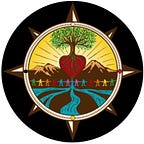California Native Peoples Reignite Cultural Land Practices & Educational Curricula: Reflections by Dr. Beth Rose Middleton Manning
The Roots & Routes IC’s Youth Visionary Collective, composed of 23 interns, was treated to a conversation with one of Roots & Routes’ Council of Advisors, Dr. Beth Rose Middleton Manning, on August 1st, 2021. As a Professor of Native American Studies at the University of California, Davis (UC Davis), her central areas of focus are environmental policy, conservation, and Indigenous land stewardship.
As R&R’s advisor, not only does she offer guidance to the organization, she also has put her head together with R&R’s Co-Founder & Executive Director Juli Hazlewood on a special forthcoming journal issue: Geographies of Hope in Praxis. The issue is a collection of articles about how to put Indigenous-led Geographies of Hope into practice by decolonizing relations in policy and collaboratively opening up relational spaces across differences.
Our conversation with Middleton Manning began with us introducing ourselves and sharing the work we are doing as interns at Roots & Routes. Middleton Manning sent along a question for us: What place do you call home? This question is not just where you are from, but more so about a place that resonates with you and relates to your identity and roots. Beth Rose inspired some interesting conversation that helped us to dig deep and get to know one another. Her response was simple yet profound:
Middleton Manning was an undergraduate McNair Scholar at UC Davis, which allowed her to gain important experience in research. She was first exposed to Indigenous environmental issues, particularly threats to California land stewardship, by her mentor Kat Anderson, author of Tending the Wild.
The lack of recognition of Indigenous rights and the resulting injustices catalyzed her passion for research that centers on Indigenous and environmental advocacy. For example, Middleton Manning has assisted in archival work and research to create maps showing the contested land situation, as well as the lack of restitution for the seizure of native lands for California Indian tribes. She addressed intergenerational trauma and healing present in these processes in her first book, Trust in the Land: New Directions in Tribal conservation.
Her most recent book, Upstream: Trustlands and Power on the Feather River, emphasizes the need for greater attention on current water issues for California Native peoples. Reductions in water quality and the spread of contaminants have negatively affected many California Indian community members, who interact with water sources in both cultural and day-to-day activities. It is likely that the effects will worsen.
“Tribal members are fishing out of the river, eating the fish. […] What follows is changing water quality standards to protect those uses. The levels of pollution allowed don’t protect that type of use.”
— Dr. Beth Rose Middleton Manning
Together with the California Indian Water Alliance, Middleton Manning recently collaborated on protecting tribes’ access and usage of clean water. They also worked together on projects supporting dam removals.
When asked for her thoughts on priorities and goals moving forwards during the all-intern question session, she highlighted three issues that have largely been neglected.
The first, curriculum development, is one of her passions. She believes that the topic is important to revisit because many diverse peoples and histories have been invisibilized in mainstream knowledge because they have not been given the space to represent themselves by telling their own stories. She says that her passion for curriculum development came from personal experience:
“Where I grew up there was a lot of gold rush history, a lot of valorization of the gold rush period; a lot of my time in Native American Studies has been unlearning much of what I was taught growing up”
— Dr. Beth Rose Middleton Manning
Second, Middleton Manning stated that increasing diverse hiring in education related to topics important to Indigenous peoples can bring about more accurate intercultural understandings and more widespread knowledge between many peoples.
Lastly, Middleton Manning underscored that climate change, particularly with more drought and wildfires in California, for example, require communities to collaboratively forge resilience and foster preparedness.
YVC’s Social Media team created this reel of Beth Rose discussing why, relative to the state of California’s 2021 Forest and Fire Resilience and Action Plan, that it is vital that Indigenous people be at the decision-making table:
Watch the video with Beth Rose here.
There are 164 tribes in California. Coming together in a large network, California Indians and their allies are confronting critical issues across the state. Middleton Manning’s work is crucial in opening spaces for Indigenous peoples to speak for themselves. Her scholar-activist research focuses on the relationships between Indigenous peoples and state-level collaborators. Indigenous knowledges and stewardship are integral to environmental and economic sustainability in California and beyond. In this quote Beth Rose highlights why intercultural pathways forward are critical:
“It’s especially important to not continue the exclusions of the past, and to foreground Indigenous leadership and partnership in these conversations that are necessary”
— Dr. Beth Rose Middleton Manning
The Youth Visionary Collective interns are thankful for an engaging and informative session with Middleton Manning. Indeed, we left with greater awareness of why Indigenous ways of knowing are vital to current-day struggles that affect the world over. Whether it is taking care of the water and land in California or creating more diverse educational spaces, Indigenous peoples must be at the decision-making table. These are the very same issues that Roots & Routes engages in and focuses on! We are thankful to Beth Rose for taking her time to come talk with us. In the spirit of reciprocity, we wanted to pass along what we gathered. We hope that you too can learn from what we have shared here.
